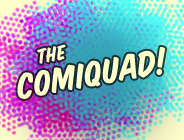Boom! Wham! Pow! The ComiQuad is a column dedicated to the spandex-laden world of comics and superheroes. It goes up each Wednesday and will alternate between comic book reviews and other comic book news. Reviews shall try to be spoiler-free. And it’s back! Zam!
This week’s edition of the ComiQuad features a Q&A with Dark Horse comics writer and Boston University alum Justin Aclin.
ComiQuad: What was your class, school, and major while at BU?
Justin Aclin: I was in College of Arts and Sciences in 2002 and I was an English major.
CQ: What extracurricular things did you do at BU?
Aclin: Slow Kids at Play was the big one. That took a lot of my time [laughs]. I also did Stage Troupe. I did chorus for one year. And I think that was it [laughs]. There’s a lot of people who were there around the same time as me that did Stage Troupe and other things who went on to do cool stuff.
CQ: When you were in college, did you ever anticipate that you were going to do comic book writing?
Aclin: I hoped. That’s been my dream and my goal since I was a kid, definitely. So that was something I always wanted to do and intended to do, and considering how long I wanted to do it, it took me a really long time to actually start writing comic books. I really didn’t start until after I graduated college but I did other types of writing while I was in school.
CQ: Do you think your work at BU and as an English major at all contributed to your writing ability or helped you with you comic book career?
Aclin: Yeah, I mean everything has been a learning experience and a progression, you know? There’s definitely stuff I picked up in writing classes that has been a great help and being in Slow Kids was an enormous boost in terms of learning how to write with partners and learning how to write towards and end-game.
You know what I mean? Writing and assuming that this is for me. When you’re doing a sketch, you know that eventually you’re going to have to put it on stage and you have to get it to a point where it might not be perfect, but it’s good enough to be seen by people. So that was one of the most important experiences that I had in college.
CQ: Did Slow Kids help you learn to write more creatively and with humor?
Aclin: Yeah, I mean, it’s funny, my progression that led me towards doing comic books was after college when I got a job at Wizard Magazine. I worked at Wizard doing their toy magazine, ToyFare.
So they had a comic strip in the magazine every month called Twisted ToyFare Theater that, instead of drawings, was done with photographs and toys. And the guys who created that later went on to do Robot Chicken. It was that style of humor. So, doing sketch comedy in college with Slow Kids helped me do that. Because the characters we use for Twisted ToyFare were always Spider-Man and the Marvel characters, that kind of gave me my first experience writing comic book style. And that propelled me into writing actual comic books.
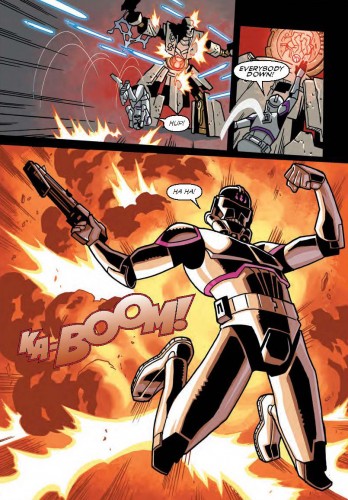
CQ: Would you say writing comic book style is different than typical, long-form creative writing?
Aclin: Yeah, definitely. You have to be able to think visually, which is not something that I’m naturally comfortable with. It’s funny, I always say that my father is a professional artist and actually used to draw comic books and my brother is a professional artist and does animation right now. And I literally draw like a six-year-old. Somehow that skipped me entirely [laughs].
I’ve never been comfortable with visuals very much, but doing Twisted ToyFare was the first time where not only did I have to write the script, but I had to figure out that you couldn’t have like six different word balloons in one panel.You had to think about your storytelling from panel-to-panel. That sort of thing.
That’s the biggest difference between writing long form and writing comics. Even writing screenplays. You know, I took a few screenwriting classes in COM and did some screenwriting and TV writing. And writing comics is even different from that. When you’re writing the screenplay, you’re really leaving a lot of it up to the director. But, generally, the way that most comic strips are written now, you’re giving pretty specific, panel-by-panel instructions to the artist. So you need to be more in touch with what you want to see happening moment-to-moment than in a screenplay.
CQ: What’s your official background with comics? What stuff have you worked on before?
Aclin: Hero House was my first project, other than Twisted Toyfare Theater, which I kinda count because it’s been collected into trade paperbacks. In terms of comic books that I wrote for myself, I did Hero House. I started writing that less than two years after I left college and it didn’t come out for another five years after that [laughs]. It was a long process of getting that to come together. So that was the first thing I did.
And following that I pitched a short story to Dark Horse for their anthology. At the time, it was MySpace Dark Horse Presents [laughs] because they were running it online on MySpace. I did an eight-page story for Dark Horse and that was based on original creations that I did. And basically, from there, I’ve been trying to work with my editor at Dark Horse to do a creator-owned miniseries and that’s slowly coming together.
But my editor was seeing my scripts and seeing what I was capable of, and so, during that time, he said “do you wanna take on a Star Wars project?” So that was how that came about. So I’ve done three work-for-hire projects for Dark Horse so far. The two [Star Wars] Clone Wars books, Defenders of the Lost Temple, which comes out on Wednesday, and then Smuggler’s Code which comes out in June. And then, in May, the first issue of a three-issue miniseries I’m doing for them comes out called Akaneiro: Demon Hunter, which is based on an online game.
CQ: What was your reaction to being offered the Star Wars gig?
Aclin: I flipped [laughs]. I was a Star Wars fan even before I was a comic book fan. It’s all very central to who I am and, it’s funny, ever since I started reading comics I think I always wanted to write comics. But as long as I’ve been a Star Wars fan, I never thought that I would get to contribute to Star Wars at all. I think it’s because it felt like such a singular vision whereas comics seem so like cooperative work.
In a lot of ways, it hasn’t really sunk in for me. Like, it’s really crazy. So I was thrilled and I was excited but I was also more intimidated than any other project that I had taken on at that point. There’s this sense that you have to come up with something that is going to be worth the name and the universe. It was intimidating, for sure.
Especially since they asked me to come up with three or so possible stories that the book could tell. And then we could hone it from there and figure out which direction to go in. And that was the hardest part. The blank canvas part of it. Other than being set during the time-frame of the Clone Wars, it can be about any characters, it can be about anything. In that stage of it, having to figure out what you’re going to do when the choices are almost limitless was intimidating.
CQ: How did you manage to choose your story and your characters?
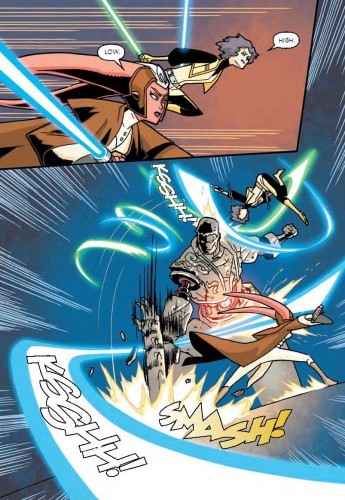
Aclin: My first idea for it was to do something with clones that somehow developed force powers and got lightsabers. That’s kind of a cool visual. You don’t usually see clone troopers or storm troopers with lightsabers. So that was the first step of it. And a note that came back from Dark Horse and LucasFilm was that they didn’t want it to be that the clones unequivocally have force powers.
By that point I had been able to narrow it down to the one clone who thinks he has the force. In the original draft it was more clear that he did have force powers. Pretty much the only note that came back from LucasFilm was “make it a little bit more questionable, maybe he does, maybe he doesn’t” and, by that point, I think, it became clear to me that it’s actually better if he actually doesn’t. But the point is that he thinks he does.
It started with that visual for me and once I narrowed it down to the one clone instead of a whole bunch of clones, the story became about “here’s one clone that’s very very different from all the other clones.” It became his story about being different and about having to figure out what his feelings about that are and how that affects him.
CQ: Without spoiling too much, what would you say the story is about?
Aclin: I’ll backtrack a bit, I know I touched upon that in the last question. Basically, Defenders of the Lost Temple is about two Jedi and four clone troopers who are dispatched to a far-flung moon to look for a dangerous artifact that could make a difference in the Clone Wars battles that are going on. And, again, without getting to spoiler-y, one of the clones, there’s something a little different about him, and he feels that he can connect to the force.
Through the course of going through the Jedi temple, he has to learn some stuff about himself and figure out what makes him himself. Whether that’s the force powers or not. At the climax of it, and it’s not really a spoiler because it’s on the cover, they are confronted by the Deathwatch, who are Mandolorian warriors also there for the artifact. And that leads to a big battle and also some self-discovery.
CQ: Would you say identity and self-discovery are core themes in the book?
Aclin: Oh yeah, definitely. It started out that that was the core theme specifically around Glitch, who is the main storm trooper. But as I was writing it, it became clear that there was a story to tell about Rennax as well, who’s one of the Jedi. She’s the Padawan.
CQ: When workshopping the story, did you get to choose to use Jedis B’ink Utrila and Rennax Omani?
Aclin: Yeah, it’s funny. Utrila is an established character, but just barely. She’s basically only appeared in like, one novel. And she appears just to get killed by General Grievous.
I knew that, when I was developing it, I was going to be creating a bunch of characters. I also knew that there’s all these Jedi out there who only have one or two appearances, so I figured, rather than cluttering up the Star Wars universe even more, I’m like, let me try and find one Jedi Master who is already established and kind of flesh out their story a little more instead of creating another one. So that was how I found Utrila. And then Rennax I decided to create.
CQ: That’s awesome. It’s really cool how you used this opportunity to make Utrila more than just about her death.
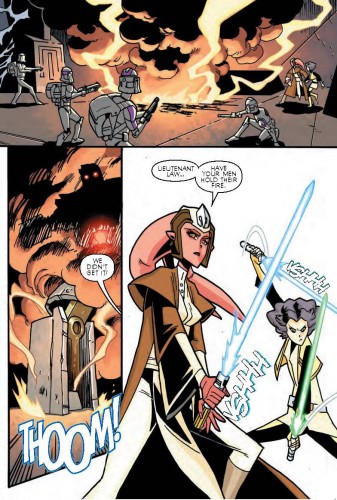
Aclin: Yeah, in a way, when writing for Star Wars, it’s fun to do the writing obviously, but there’s almost an other layer where it’s almost like a game [laughs]. There’s this huge, established lore already and I was looking up stuff on Wookipedia and cross-referencing things from there and it almost feels like a world-wide roleplaying game where only a few people get to contribute [laughs].
So there was definitely a sense where I wanted to take parts of it and add a little bit on. And pass it on to the next person as well. And I should definitely note that any continuity ties like the gauntlet they’re going after is an established artifact. All that stuff is just easter eggs. You can definitely go into the book if you’re barely familiar to Star Wars, you can still understand it.
CQ: That actually perfectly segues into a question I was about to ask. Is the story new reader accessible? Both to people who don’t have knowledge of the animated series or Star Wars in general?
Aclin: Yeah, that was my goal. I think that as long you know that Jedi have lightsabers and force powers and that clone troopers are clones, you can pretty much figure out the rest of it as you go along.
The Clone Wars graphic novellas that Dark Horse does are their all-ages Star Wars entries. I was definitely told that we want this readable by eight-year-olds. But my editor, one of the first things he said to me, was “don’t worry about it being a story for kids. Make the best Star Wars story you can. And don’t have any graphic dismemberment and you should be fine” [laughs].
I definitely wanted to write something that I thought adults could enjoy as well. It’s actually neat to be able to write something that kids can pick up as well. Because a) I was a Star Wars fan when I was a kid and b) I have daughters and it’s kinda cool that they’re going to be able to read something that I’ve written.
CQ: That’s great. One of the criticisms I’ve seen about the comic book industry recently is that there aren’t always enough comics for kids and that many comics don’t have enough female heroes, so I think that this book is accessible on both of those fronts.
Aclin: Yeah, I definitely think that as an industry, we need more stuff that kids can pick up. And I think that there’s a stigma on “all-ages” now as being just for kids. I think there’s a lot of really great all-ages books over the past several years that adults can enjoy as well. It would be great if comic book fans could get beyond that [laughs].
And as for female characters, it’s funny, my first comic, which was Hero House, the premise of that is it’s about a college fraternity for superheroes. It was a superhero team/frat. And there’s really barely any female characters in it at all. And it was my first time writing and, while I’m proud of it, there’s a lot of stuff I’d go back and change about it. One of the things that really bothers me the most is that there’s really no female characters involved in it. That’s one of the things that I’d definitely change. Nowadays, I find myself a lot more interested in writing female characters, not only more than before, but more now than male characters [laughs].
CQ: You mentioned in an earlier email that Hero House was based on a “fictionalized BU.” Can you elaborate more on that?
Aclin: Yeah, it was funny because obviously BU doesn’t have huge Greek life and the comic is about a frat, but when you go back to the origin of the idea for me, one day it kinda struck me that both fraternities, at least as I understand them through media and like Animal House and that sort of thing [laughs], and superhero teams are these groups of people that kind of live and do everything together and give each other funky code names [laughs], that was the lightning bolt that hit me for that idea.
And I was like, well I’ve never been in a frat, but I have been in Slow Children at Play which also fits that description [laughs], so Slow Kids was definitely my touch point for Hero House. And it’s a lot about, it’s kinda based on my experiences as a freshman coming in. My freshman class with Slow Kids, we were the last class that worked with the founders of the group, as they were graduating. So, it was that kind of, the new guard coming in and getting to work with these kind of intimidating but also hugely dedicated people and that influenced the feel of the story of Hero House as well.
And then, other BU parallels, in my mind, I don’t think it’s ever stated explicitly, but in my mind it’s set at Bay State University. You know, Spider-Man’s fictionalized university is Empire State University, so I figured I’d take that naming convention and use it [laughs].
And the other thing is, it’s barely a spoiler to say, but basically the main villain of Hero House is the president of the university. And when I was at BU, I had, in my mind, kind of a one-sided, adversarial relationship with John Silber, who was chancellor at the time. I know he just passed away, not to speak ill of the dead or anything. I don’t know if the guest policy has changed a lot since I was there; I hope it has because it was ridiculous. Like it was really, really hard to have guests over. My senior year, I had gotten engaged to my wife during Christmas break and it was a huge hassle to visit at BU because the guest policy was just ridiculous. And John Silber was the driving force behind that. I was actually a columnist for the Freep at the time. So I wrote a lot of broadsides against John Silber [laughs], so, you know, there was this kind of one-sided adversarial relationship in my mind. So that’s where the idea of using the university president as the villain came from.
CQ: I believe the guest policy has changed for the better. I think some people would still complain that it’s too strict, but it doesn’t sound as restrictive as it may have been in the past.
Aclin: Good. I’m happy for you guys [laughs].
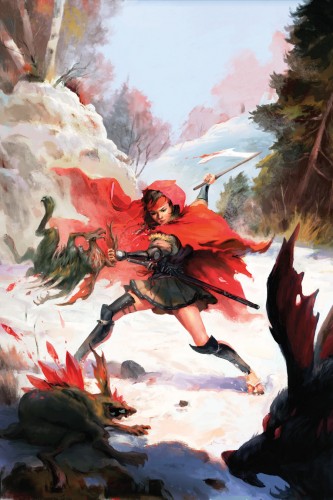
CQ: When I was reading the preview of Hero House, I believe it was the president who made mention of the football team and I laughed because we don’t have that.
Aclin: Yeah, obviously it’s not a straight one-for-one, but there are certain things. As you can see in the preview, the main character is jogging along the Esplanade and on the river. So there were certain things at BU that I was picturing while I was writing that.
CQ: What was the most fun about writing a Star Wars story?
Aclin: I had a lot of fun writing the sound effects [laughs]. It’s kind of a weird thing. Especially when I was writing Defenders of the Lost Temple, I decided that “Vshhh” would be the sound effect for lightsabers coming out and that “Vmmm” would be their humming noise. Deciding what all the different lightsaber sound effects would be was funny.
And getting to write them? I’m a huge lightsaber fan [laughs] and when I finally got the art and saw the first page where Utrila and Rennax have their lightsabers and are using them to attack the droid, the colorists had done such a fantastic job, and I kinda got chills. It’s amazing looking. So I had much more fun writing the sound effects than I thought I would.
CQ: Anything else you’d like to add about the process?
Aclin: When someone says to you, “just write the Star Wars comic you want to read,” as a lifelong Star Wars fan, you have to sit down and figure out “what is it that I enjoy most about Star Wars?” So I discovered that I apparently don’t like the outer space spaceship battles because I didn’t include any in either of the books I wrote. But I definitely like lightsabers [laughs]. And, overall, just that sense of fun. That’s what I got from the original movies and that’s what I wanted to capture. And hopefully I did.
And as for the next book, Smuggler’s Code is an Obi Wan-centric tale, so that was it’s own kinda fun. I really enjoyed creating characters and using under-used characters the first book, but getting to tell a story with one of the big guns of the universe is a lot of fun too.
CQ: Are there lightsaber sound effects in that one?
Aclin: Oh yeah, for sure.
CQ: Lastly, what are all the other projects you have coming down the pipeline after this?
Aclin: Like I said, Defenders of the Lost Temple comes out this week in comic shops. And then, in May, I don’t have the exact date, unfortunately, but with May comes the first issue of Akaneiro: Demon Hunters #1 and that’s a three-issue miniseries. And that’s based on an online game from a developer named American McGee, which is known for the Alice in Wonderland games and known for his own twist on doing fairytales.
So this is his take on the Little Red Riding Hood legend who is a demon hunter in 19th century Japan. So that’s what the premise of the game and comic is. It’s pretty cool. And the art on that is incredible. It’s art by Vasilis Lolos, who’s a really established guy who’s done a lot of great stuff. It’s incredible art. And Smuggler’s Code is out in June.
Star Wars: Clone Wars – Defenders of the Lost Temple by Justin Aclin and Ben Bates is out in comic book stores today! Look for Star Wars: Clone Wars – The Smuggler’s Code and Akaneiro: Demon Hunter out later this spring, both by Dark Horse Comics.

